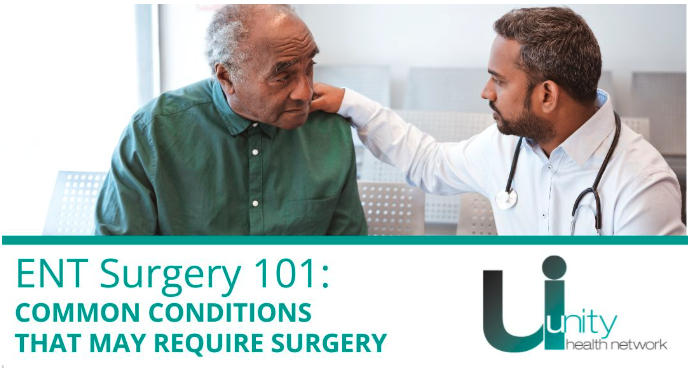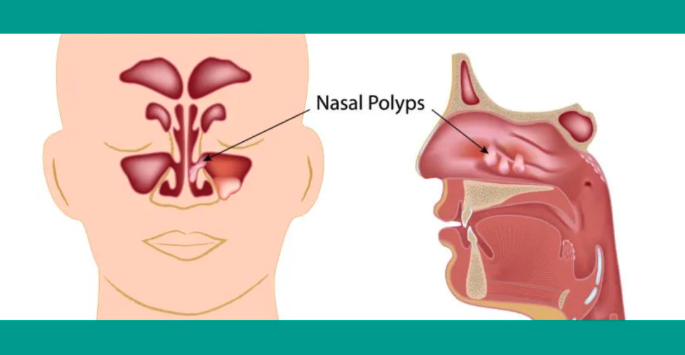ENT Surgery 101: Common Conditions That May Require Surgery
Jun 25, 2025

Author: Dr. Seth Willlen
READ BIO
If you or someone you care about has been dealing with chronic ear, nose, or throat issues, you may be wondering if surgery is the next step. While not every ENT condition requires surgery, there are situations where it becomes the most effective treatment.
To help explain when ENT surgery is recommended and what conditions often lead to it, we spoke with Dr. Seth Willen, a board-certified Otolaryngologist (ENT specialist) at Unity Health Network. Dr. Willen shared his insights into how these decisions are made and what patients can expect.
When Is ENT Surgery Considered?
ENT surgery is typically recommended after other treatments, such as medications or lifestyle changes, have been tried and haven't worked. The decision is based on the type of condition, how long it has lasted, and how it affects your daily life.
"It really depends on the problem," said Dr. Willen. "We look at the severity, how long the symptoms have lasted, and how the patient has responded to other treatments first."
In most cases, surgery is only considered when symptoms become chronic, recurrent, or significantly impact quality of life.
Common Reasons ENT Patients May Need Surgery
This is one of the most common reasons for ENT surgery in children, although adults can also be affected. When fluid builds up in the middle ear and causes hearing loss or frequent infections, a procedure may be recommended.
"If there is prolonged fluid in the middle ear resulting in hearing loss or repeated episodes of middle ear infections, that’s an indication for what we call a myringotomy and placement of ear tubes," Dr. Willen explained. This minor procedure helps drain fluid and reduce infections.
Chronic or Recurrent Tonsillitis
When tonsil infections happen often, removal may be necessary. This procedure is known as a tonsillectomy.
"If tonsil infections occur four to five times over the course of a year, that’s an indication for removal," said Dr. Willen. "We also remove tonsils for obstructive sleep apnea or if a tonsil appears abnormal or asymmetric."
Nasal Polyps or Severe Sinus Problems

People with nasal polyps or chronic sinus infections often start with medications such as nasal sprays or steroids. If those don’t work, surgery might be needed to improve breathing and reduce symptoms.
"Nasal polyps alone may be an indication for surgery," Dr. Willen said. "If a patient doesn’t respond to nasal sprays or oral medications, we may recommend polyp removal to improve symptoms."
Deviated Septum (Septoplasty)
A deviated septum occurs when the thin wall between your nostrils is off-center, making it difficult to breathe through your nose. When this structural issue doesn’t improve with medication, surgery can help.
"A septal deviation that causes difficulty breathing and doesn’t respond to nasal steroids like Flonase can be a reason for surgery," noted Dr. Willen.
Enlarged Thyroid Causing Compression
Sometimes, the thyroid gland becomes enlarged, causing pressure on the throat or windpipe. This can make breathing or swallowing difficult, especially when lying down.
"If a patient has a very enlarged thyroid and experiences what we call compressive symptoms, like trouble breathing or swallowing, those are clear indications for surgery," said Dr. Willen.
How ENT Specialists Decide If Surgery Is Right
ENT specialists use a combination of physical exams, patient history, imaging (like CT scans), and response to prior treatments to determine if surgery is the right choice. Every case is considered individually.
"We look at the full picture: how often symptoms are happening, how severe they are, and whether medications or other therapies have worked," Dr. Willen said. "Surgery is never the first step unless absolutely necessary."
The decision is also a shared one. Physicians work with patients to understand their symptoms and goals and weigh the risks and benefits together.
What to Expect Before and After ENT Surgery

Before surgery, patients typically meet with their ENT specialist for an in-depth consultation. This may include a nasal endoscopy, hearing test, or imaging, depending on the condition.
Preparation might involve stopping certain medications, fasting before surgery, or arranging for post-operative care. Many ENT surgeries are performed on an outpatient basis, meaning patients go home the same day.
Recovery times vary by procedure, but most patients experience improvement within a few days to a few weeks. "These are very common procedures," Dr. Willen said. "For many patients, especially those with nasal polyps or tonsil issues, the improvement in symptoms can be seen quickly after surgery."
Don’t Ignore Persistent Symptoms
If you've been dealing with the same symptoms for months, whether it's blocked nasal passages, frequent infections, or difficulty breathing or swallowing, you should seek the help of a specialist.
"If something keeps coming back or isn’t improving, it’s worth getting checked out," said Dr. Willen. "We do a focused evaluation and help patients figure out what’s really going on."
Getting care earlier can mean fewer complications and a faster return to normal life.
Conclusion: Is ENT Surgery Right for You?
Not every ENT issue requires surgery, but for certain conditions, it can be life-changing. Whether it’s ear tubes for your child, relief from chronic sinus problems, or addressing a breathing issue, ENT specialists like Dr. Willen are here to help.
If you think you may need to see an ENT for surgical evaluation or another ear, nose, or throat concern, contact Unity Health Network to schedule an appointment or consultation.




